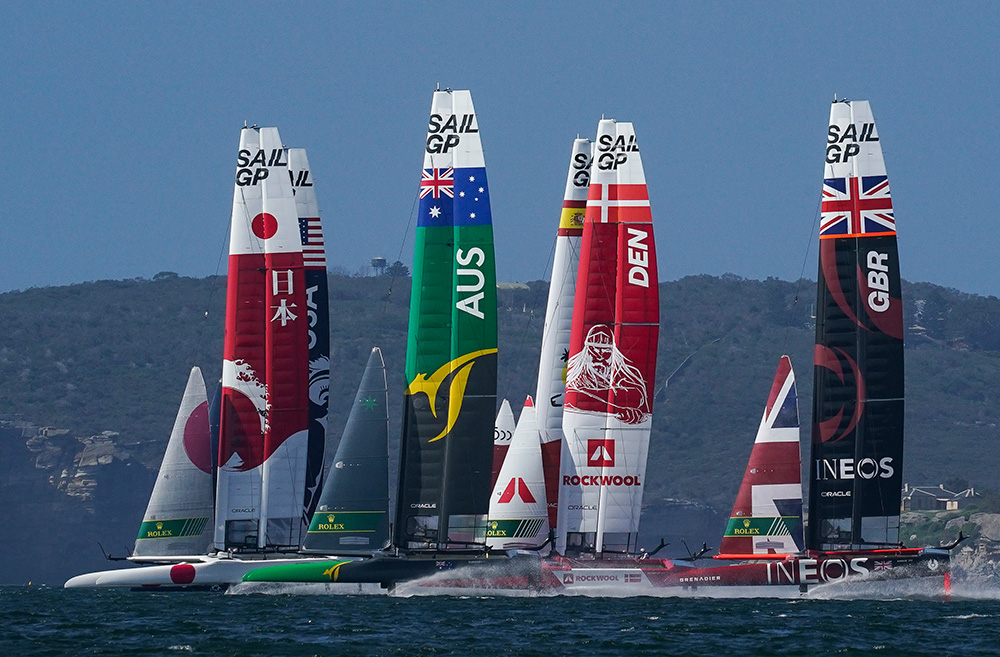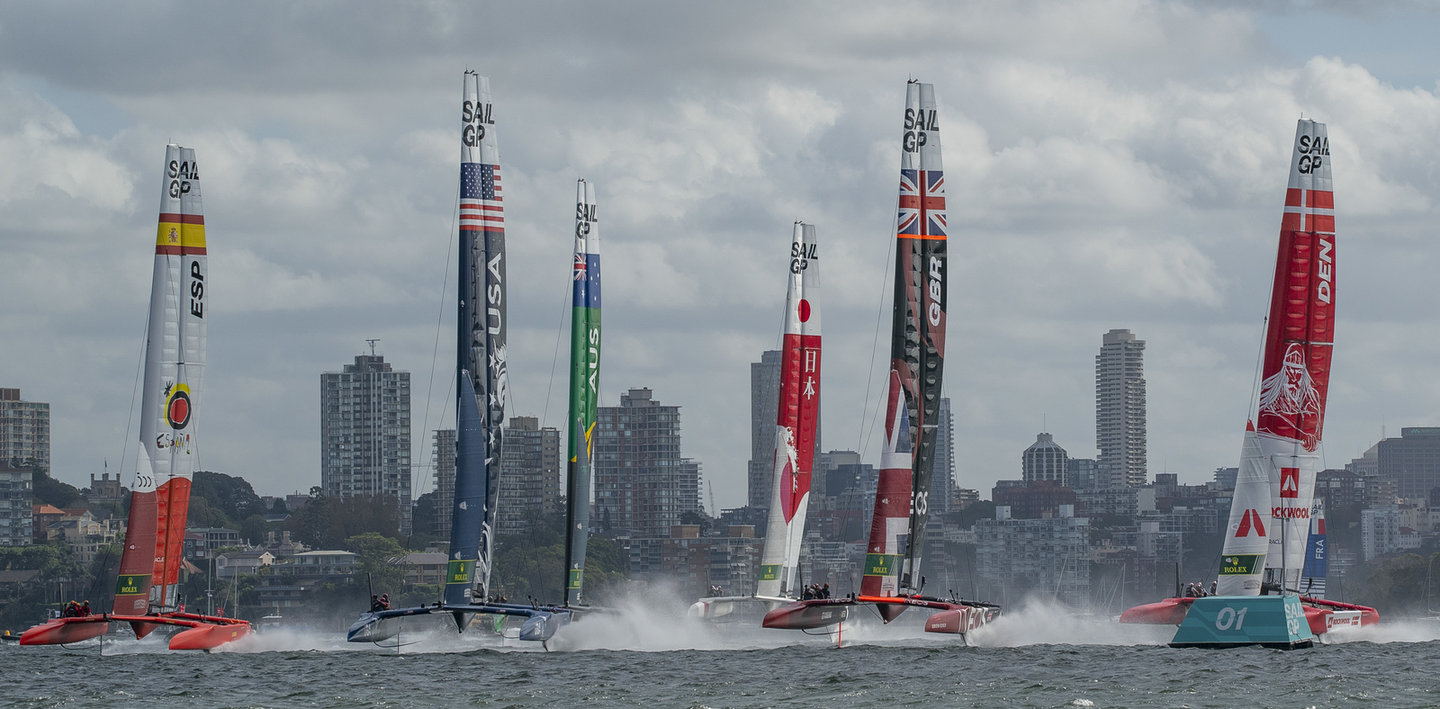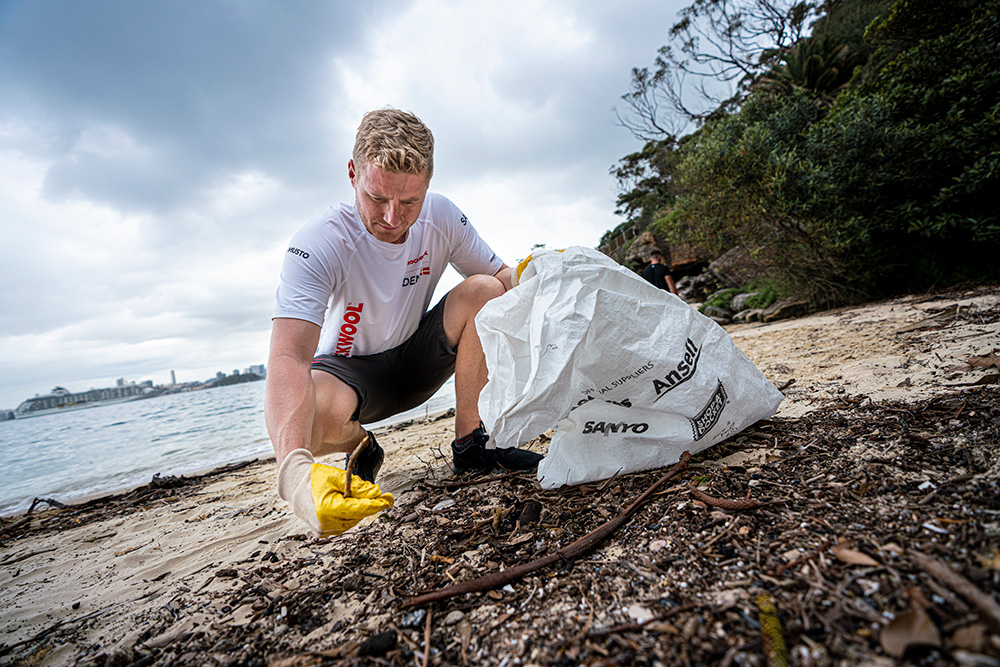A green future for the deep blue seas
For a land-based sports entity to embrace sustainability and place environmental concerns at the heart of its business, is one thing - for a league based on the oceans, it’s quite another. Euan Cunningham meets Fiona Morgan, director of purpose and impact at SailGP, to discover how that’s possible, where the drive to take action comes from and what ambitious plans are next.
The sports industry is finally recognising the very real and glaring threat facing the planet, and naturally, examples of environmentally friendly sports clubs and organisations are easier to find than ever before.
However, many of these projects are land-based - unsurprising, given mankind’s natural inclination to attempt to preserve and conserve our own habitats as a first priority - with little attention (until recently) paid to the issue of sporting sustainability on the high seas.
SailGP, the annual sailing series, is in a hurry to change that.
Conceived in 2018 and launched a year later, the organisation is the brainchild of Larry Ellison, founder of US technology giant Oracle, and Sir Russell Coutts, the highly-decorated sailor and former chief executive of the America’s Cup Event Authority. Since launch, it has consistently made waves for what represents a revolutionary approach to sustainability in the sport.
Season two, which gets under way off the coast of Bermuda in late April, will be the first climate positive sports and entertainment property in history, and by 2025 all its operations at sea will have shifted from fossil fuel-based technologies to 100 per cent renewable power.

SailGP aims to reduce its carbon footprint by 55 per cent by 2025
The organisation has also publicly stated that it will reduce its total carbon footprint by 55 per cent over the next four years, and that the remaining amount is to be offset by carbon credit schemes.
Bold statements, maybe, but ones that SailGP is intent on acting upon, Fiona Morgan, the series’ director of purpose and impact, insists.
Morgan, who took up the role in October last year, having previously been head of group campaigns at the corporate and social purpose team of UK pay-television’s Sky, tells Sportcal Insight: “Because this is a new organisation, we’ve got sustainability in our DNA.
“SailGP is about challenging the norm, growing the issue and making sure we produce real change here - which we can do, because we’re still small and agile.
“New projects have been taken on very quickly because we’re not hide-bound in our processes, so there’s no red-tape for any sustainability-based ideas.
“Although we don’t want to rush things, you’re going to keep seeing ambitious goals and targets being set.”

Fiona Morgan, SailGP’s director of purpose and impact
With just one race possible in Sydney early last year, the 2020 SailGP season was cancelled entirely because of the outbreak of the coronavirus pandemic and the organisation is certainly trying to make up for lost time.
Morgan says she wants “people to look back on us in 10 years… and think we’ve had an impact in that respect… It’s absolutely achievable because we’re a new sports league, I think we’re actually just on the edge of a new sporting era rising.”
“SailGP is about challenging the norm and making sure we produce real change.”
At the turn of the year, SailGP launched its all-encompassing ‘Race for the Future’ campaign, the sustainability programme which, Morgan says, is all about “bringing forward meaningful change, through our sport, leading to a cleaner and more inclusive future.”
Foremost among the initiatives planned for the next few years, SailGP intends to upgrade all its race boat engines to electric models by 2025, using energy produced by wind and solar power - as well as through other, more technologically-complex solutions.
Indeed, it wants to launch as many as 10 electric racing projects in the next four years, all supported by its own R&D division.
In order to achieve this, both existing and as-yet-undeveloped technologies will be used - and SailGP also intends to find solutions to reduce the substantial carbon footprint of manufacturing new engines.
When the boats have been finally discarded by their teams at the end of their lifespan, the aim is for them then to be fully recyclable.
The competition also plans to bring this sustainable approach to both its spectator boats and monitor vessels that travel alongside the main racing fleet, with Morgan saying these too will eventually be solar-powered.
Morgan says that this season, “from the European races onwards, we’re looking at having multiple support boats powered by nature… This season is all about testing these technologies.”
Two technology partners, which SailGP will eventually invest in if things go to plan, have been brought on board to make the necessary changes to the vessels.

SailGP has an eight-race calendar lined up for 2021-22
The on-shore branches of SailGP’s race operations - for example, the team facilities, the workshops, and the corporate areas - have also been thought of.
Morgan says the organisation “is close to finalising a temporary clean energy deal for this season… we want to get this done as quickly as possible.”
Generators using clean fuel - season one used vegetable oil for example - will service SailGP’s business operations and facilities, while solar power is already being used to keep batteries constantly charging.
Morgan points out how these ambitions and existing projects contrast to other notable sailing competitions such as the prestigious America’s Cup, in which all vessels are still diesel-powered.
With all these changes, the director says, “next season [2021] is critical - it’ll show like-minded partners how we operate, who then hopefully can get on board, having seen our reputation grow.”
Morgan points out the all-encompassing nature of SailGP’s sustainability drive - she wants the organisation to have this as a focus across every aspect of its operations, including throughout its brand partnerships, across its broadcast operations, and through the eight teams set to compete this year.
Of particular interest is the focus on partnering with like-minded organisations, in terms of sponsors, broadcast partners and host cities.
She continues: “Every conversation we have with partners is based around our purpose and sustainability just as much as the sporting legacy… And actually all the partners we choose want to talk about these issues as well.”
Close working ties have been forged with the SailGP commercial team as each partner is brought on board.
“I understand their pressures, we’re very aligned… I don’t really have to fight my corner because people here are already believers - that’s why I came into the company,” Morgan notes.
Conversations with brands looking to partner with the organisation involve “assessing how we can help each other in terms of our environmental impact, not just about where their logo should fit on our boat.”
Brands to have signed up with SailGP since its launch include Oracle, luxury Swiss watchmaker Rolex (these two are both main partners), while the official supplier list includes UK-based Marlow Ropes, technology firm Acronis and Future Fibres, a composite cable-rigging manufacturer.
Marlow, the last of these partners to have come board - in October last year, was described by Coutts at the time as “sharing our passion for sustainable innovation… Their products provide the quality needed to help power our race boats, and they are achieving that in an environmentally responsible manner.”
Morgan adds that SailGP is working on “some really exciting partnership announcements… with brands we can get inspired by in terms of their sustainability work.
“With all those brands, we’ve had sustainability directors in every meeting so far, we talk about how we operate, about how we can give them added value through our initiatives."
“Every conversation we have with partners is based around purpose and sustainability.”
She stresses that when bringing brand partners, host cities (for which SailGP plans to put a legacy project in place) and even the teams up to speed with objectives and projects in that area, “we don’t want to scare people away, we need to make these challenges engaging for the people and companies we work with.
“We’re always asking questions about their strategies - we want to share their worries and risks, as well as help them learn from us.
“We’re not judging these brands on what they’ve done before, because sustainability for a long time was something people in sport didn’t really seem to understand. Everyone’s committed, but some are definitely on different stages of that journey to others.”
This can be seen in the early presence of Ineos, the chemicals and industrial giant that would to the casual observer not be associated with an ethos of sustainability, as a former team sponsor of the UK outfit.
Morgan says this is also the approach the organisation takes with regards to its eight teams - from Australia, Denmark, France, the UK, Japan, New Zealand, Spain and the US.
She says that SailGP is working towards “each team having one sustainability partner… which will have a prominent branding spot for several years, hopefully.”
All eight outfits are different in their approach to sustainability, Morgan says, adding that “I’ve got to know them since coming in, we’ve worked with the sailors and team members and they’ve embraced it so far.”
The teams have also been set targets in this sphere: “Each team has to know their carbon footprint, so we’re tying in sustainability alongside their sporting goals.
“We’re finalising a strategy to create an incentive, through extra points or a prize, for them to reduce their footprint.”

Teams are given sustainability-based projects to engage with
Morgan cites Rockwool, a multinational manufacturer of mineral wool products which signed up as title sponsor of the Danish outfit in late 2019, as an example of “an incredible leader in sustainability - that’s a partner coming in which sets really committed targets and fits our message perfectly.
“Hopefully we’ll see more collaborations like that soon.”
These partnerships, both at an organisational and teams level, and the various renewable energy projects SailGP is embarking on, are all aimed at offsetting the inevitable hefty carbon footprint produced by the worldwide nature of the calendar - in 2021-22, eight races will take place, across disparate locations such as Bermuda, the UK, New Zealand and the US.
Morgan says: “What we’re doing with the unavoidable part of our global footprint is to offset it by bringing in renewable energy partners, including the One Carbon World organisation, and we’re aiming to remove more carbon through that than our footprint creates, so essentially buying more than we need.”
SailGP is also looking at plans for fans to get involved in the sustainability efforts. For example when a spectator buys a hospitality ticket for any of this season’s races, an amount will be included in that sum to offset the carbon impact of the trip, and similar action will be taken for merchandise sales with the aim of having a ‘climate-positive’ shop.
“We think the fans will like that, it’s an easy way for them to make an impact and be better in that respect - more sports need to do this, to give their fans more of an option,” she adds.
“Sport has to get climate change under control - I just hope traditional organisations embrace our stance.”
Work is also being done with broadcast partners - which for the 2021-22 season includes Sky in the UK and Ireland, Fox Sports in Australia, TV2 in Denmark, Spain’s TVE, France’s Canal Plus, over-the-top streaming site DAZN in Japan and CBS in the US - to help reduce their carbon footprint while covering races.
“We already have remote broadcast operations in place for our races, and were doing that before the pandemic made it mainstream, but in season two we’ll be going even further to make the TV coverage more efficient,” Morgan says.
As well as the team members and athletes, every staff member SailGP hires from now on will have a sustainability aspect to reviews of their job performance.
“Every single person in SailGP has to bring this overall purpose to life,” she says.
“Sport has to get climate change under control - if you want to change the world, use sport. I just hope traditional leagues and organisations embrace our stance and get on board.”